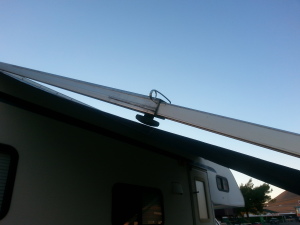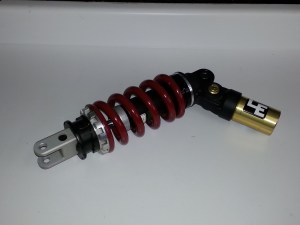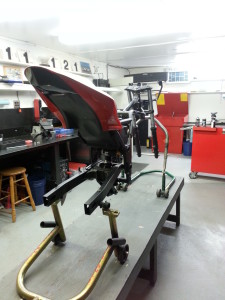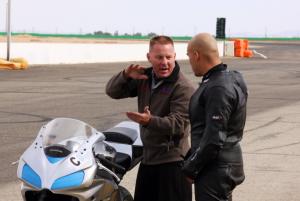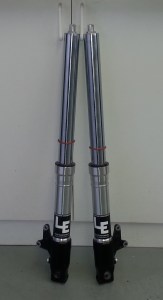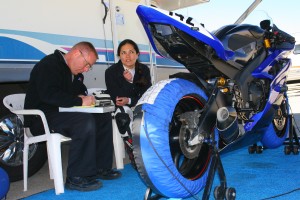Pro Racing Needs Eyeballs #6
Racers Ed Sorbo and Michael Gougis talk about why free TV – not paid TV – is so important for pro racing. A discussion ensues as to what racing and religion have in common, and what a highside on the moon might look like.
Podcast: Play in new window | Download
The Next U.S. Road Racing World Champion #5
Racers Michael Gougis and Ed Sorbo talk about where the next World Champion motorcycle road racer born in the U.S. is coming from. A discussion ensues as to whether it would be cooler to have Batman’s utility belt or Felix’s magic bag of tricks.
Podcast: Play in new window | Download
Coasting
Verb. To be awake just enough to know that you are still sleeping, warm and snug with no great need to get up yet.
Usage: I coasted till 11:30 am today, it was great.
The Answer Is Blowing In The Wind
Drag Racing
What does a 200 pound drag racer with a 12 inch extended swing do to hold up the back of his CBR1000RR for street riding and drag racing? He sends his shock to Lindemann Engineering for a much stronger spring and a re-valve. Little did he know that he would get set up instructions so he can change the clickers for best street riding and best drive out of the hole at the strip. Hey Marcus, remember to change it back to the street setting when you leave the track!
Cost of Racing
Over at MotorBikeRacing.blogspot MG has another good post up about the cost of racing. He’s talking about the BS’ness of rules to make racing costs less when the Factories are involved.
How does this apply to club level racing? The same way. You are going to spend all the money you can/have. The smart think to do is, pick the bike and class or classes that you can afford to compete in. Not just on the money scale but also on riding and tuning skill scale.
Every time the rules are used to try to reduce costs we just spend the money on something else. That does not mean the rule makers can ignore the costs of stuff. It does mean that cost control is up to you.
Building A Better Foundation For Professional Road Racing #4
Podcast: Play in new window | Download
Just The Beginning
You may think that paying me for your job is the end of our contract but to me it’s just the beginning of a path to wisdom. Hoge just got his CBR900RR back together after sending me his forks and shock for rebuild, valving and springs. As is common, he did a few other maintenance/improvements at the same time.
His e-mail is common, full of wonder at the magnitude of improvement and hints of a new understanding. The best term I’ve found to describe the newness you will experience is a massive increases of data.
The next step is playing with the clickers. Ride the bike with them open and closed to learn what they do. When you tried this with stock suspension the difference was too small to feel. This will not be the case now, be wise as you test.
Some data will not fit your suspension/chassis theory, your theory must change. Contact me with your questions, the path we travel is long and winding, full of twists and turns, wiggles and waggles, banked and off cambered challenges. Enjoy your ride in the sunshine.
Travel O-Rings
When you get your forks back they will have a Travel O-Ring on each leg. They are more in the cool thing to do than the useful information category. They show how far the forks compress at maxim travel. Big bumps or hard braking.
This is nice to know but remember it only tells you the max travel, not the normal travel. Why two? After you make a change to can move one of them back to zero to see if your change makes you use less travel. If you use more travel they will both move.
If you don’t like them you can cut them off. Another way to do this is with a dry eraser marker. Just draw a line up the fork tube. The seal will wipe off the marker.
Max travel is noted on your invoice. Most forks don’t go all the way down.
Coaching
Lindemann Engineering’s Ed Sorbo is now accepting clients for personal rider coaching and crew chief days.
The cost is $750 per day for one client, $1000 per day for two to four clients at the track day or race of your choice, and at the Southern California track of your choice. Got one, two or three riding friends? Split the cost. $500, $333 or $250 each is a steal and I can keep all of you on your toes. Beyond Willow Springs, Streets of Willow, Buttonwillow Raceway Park, Auto Club Speedway or CVR, travel expenses will apply.
As your Crew Chief, Sorbo will help you with your bikes set up from suspension to gearing, from tire pressure to slipper clutch adjustment and everything in between. Sorbo and clients do a briefing after each ride to improve the bike and the rider. The emphasis is on teaching you the what and the how so you understand the bike, what it is doing and what it needs from you.
As your Riding Coach, Sorbo will ride with you, observing and demonstrating proper techniques and lines. In the pits, Sorbo will work with you to improve your riding with the emphasis on developing your own method of noticing, remembering and recording what you and your bike are doing on the track.
Generally, a day will start with crew chief work, and then move to coaching. Some clients will need more of one or the other. Again the emphasis will be on what you need, not a set schedule or curriculum. Says Sorbo, “I find that my experience makes me notice a rider’s weakness at first glance. I developed this skill from all that racing I have done, and for sure my MSF training helped. I don’t see any point in covering skills that you have already mastered. I want to pick out the few things you don’t know about or are having trouble with and fix them – right now.”
Sorbo started racing in ‘82, won his first race and just kept on racing. Along the way he has raced 77 different bikes on 54 different tracks. He holds five club Overall Championships – that alone makes him an Ace. He moved from Hawaii in ‘98 to live in an RV and make a living as an AMA Privateer riding Yamaha TZ250 GP machines. After six years, one podium finish and a best overall of 5th he became a full time crew chief for Chris Ulrich and others. He still races and has spent the rest of his time since 2011 as the owner of Lindemann Engineering.
So he’s fast, understands suspension and can set up a bike. Can he teach?
“Both my parents are teachers, I’ve always been a teacher first and a shop owner or race club owner or suspension tuner second,” Sorbo says. “I started my first track day/riding school in 1987. I’ve always known that the best way to keep a customer is to teach them.”
As a suspension vendor at numerous track days adjusting clickers and giving a little riding advice I help my clients drop an average of four seconds per lap and I make their tires last longer. With a full day I can help you go faster with less risk, more fun and less effort. With a full day I can help you make your bike faster with less wear and tear on it and your tires.
Pick an event you like and shoot me an e-mail to make a reservation. Check out the Coaching page on my web site to see if others are looking to share an event.
le-suspension.com
ed@le-suspension.com
(909) 838-4587

